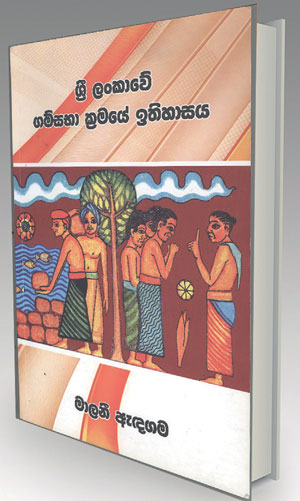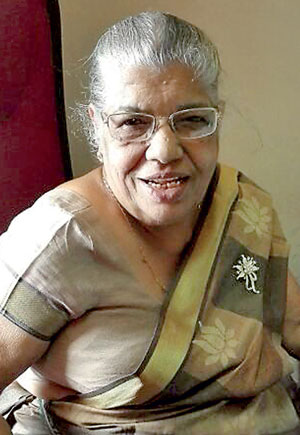Reply To:
Name - Reply Comment
Last Updated : 2024-04-24 13:07:00
 Power devolution is a concept that is in the news these days, with the constitution-making process proceeding. In a way, it has become a sensitive political topic in the south, whereas the northern constituency is seeking extensive power devolution on Federal lines. Yet, what should be done for empowerment of people politically? Prof. Malani Endagama, a renowned scholar of history and the Secretary to the Mahawamsa Compilation Office of the Cultural Affairs Department, answers this question with emphasis being placed on the need for decentralization of administrative powers on the ancient Gam Sabha system. She says such a system was in Sri Lanka right from the era of King Pandukabhaya in the fourth century B.C. till the advent of Western colonial powers. The Gam Sabhas, as attested by rock inscriptions, even carried out judicial and banking services, as put in modern terminologies. After an extensive research into the subject, she has also written a book as well on the system. Excerpts of the interview with her:
Power devolution is a concept that is in the news these days, with the constitution-making process proceeding. In a way, it has become a sensitive political topic in the south, whereas the northern constituency is seeking extensive power devolution on Federal lines. Yet, what should be done for empowerment of people politically? Prof. Malani Endagama, a renowned scholar of history and the Secretary to the Mahawamsa Compilation Office of the Cultural Affairs Department, answers this question with emphasis being placed on the need for decentralization of administrative powers on the ancient Gam Sabha system. She says such a system was in Sri Lanka right from the era of King Pandukabhaya in the fourth century B.C. till the advent of Western colonial powers. The Gam Sabhas, as attested by rock inscriptions, even carried out judicial and banking services, as put in modern terminologies. After an extensive research into the subject, she has also written a book as well on the system. Excerpts of the interview with her:

QWhat is the speciality of our Gam Sabha system in today’s context?
Human civilizations started with village administrations on the planet. In Sri Lanka, even during the period of King Pandukabhaya of the fourth Century BCE, there is inscriptional evidence that such a system existed in our country. The Mahawamsa says the King determined village boundaries ten years after his enthronement. Villages functioned as separate administrative units even at that time. Before that, he started town administration.
In the present context, it is nothing but local administration under the central authority. Local administration is very important here because villages are large in number both now and were so then.
It holds significance in today’s context because everyone talks about the importance of good governance. Good governance is the administration that involves people and is beneficial and friendly to them. Local administrative unit is fundamental to it. Then, good governance is not a concept alien to us.
QHow independent should they be from the central administration?
Power devolution is not the concept here. I have to stress it categorically. We have to be cautious in the use of terminologies. Power devolution is associated with the Federal system of governance being practised in the countries such as the United States and India.
 What we inherited from history is not that. There is no power devolution involved here. It is the decentralization of power. In the decentralization of power, the central government delegates whatever power it wants to local units. A central government has legislative, executive and judicial powers. That is to make laws, to implement them and to monitor the implementation process. That is all. Federal states are formed by devolving these powers. Power has been devolved in the United States and India.
What we inherited from history is not that. There is no power devolution involved here. It is the decentralization of power. In the decentralization of power, the central government delegates whatever power it wants to local units. A central government has legislative, executive and judicial powers. That is to make laws, to implement them and to monitor the implementation process. That is all. Federal states are formed by devolving these powers. Power has been devolved in the United States and India.
In the decentralization of power to local administrative units, powers are not devolved to them, but delegated. The central government delegates a certain amount of power needed for these units to carry out affairs of the localities concerned. That was what Gam Sabha system had. Power devolution and decentralization are two different concepts. When power is decentralized, people are directly involved in administration of their own affairs. In the ancient era, the senior most citizen of the village concerned became the head of Gam Sabha. Heads of different family units were members of it. They looked after agriculture and irrigation activities, road construction work, temple maintenance etc on a voluntary basis. No election process was involved in this respect.
QBut, in the book authored by you, there is reference to the delegation of judicial powers and banking services even. How was that?
Jana Sabhas even looked after judicial matters. Jana Sabha heard minor offences such as thefts, credit issues, assault cases etc. Mostly, the cases were mediated by Gam Sabhas rather than punishing wrongdoers at that time. If it were a default case, the defaulter was asked to pay, at that time, in grain or something else as currency notes or coins were absent. In murder cases, Jana Sabhas or Gam Sabhas referred them to the courts of the ruling kings. Actually, the kings used Gam Sabhas to support him in governing. If a crime was reported, Gam Sabha was assigned to trace culprits. Otherwise, the Gam Sabha concerned was subjected to a fine. The entire village is involved in administration under the leadership of headmen. We had this system till the colonial rule.
QHow do you compare and contrast the current local authorities’ administration with ancient Gam Sabha system?
During the ancient era, we had towns and villages. Actually, a very few towns existed. At that time, there was the capital of the kingdom concerned. It was occupied by the king. We had external trade at that time. Along the coastal line, there were ports of trade functioning as towns. A proper town administration system had been in place. Yet, three-fourths of the country consisted of villages.
During the colonial rule, the focus was external trade. They came here for trade purposes in main. Then, a lot of towns emerged. With that, a lot of problems also arose in regard to administration of towns that had sprung up. The Portuguese and the Dutch profited a lot from trade. When the English came, such trade revenue had dropped to some extent. The English had to fight with the Kandyans. In 1818, a major uprising was launched to topple the English rule. By 1833, the English rule could not achieve its objects as expected. Then, they appointed the Colebrook Commission. It was assigned to find why revenue dropped. Its first recommendation was to prune state expenditure and to reduce the number of official posts. When implementing these recommendations, the English rule did away with a number of posts, and abolished pension systems. Besides, it was recommended to do economic development as a means of income generation. For this purpose, land utilization came in for the plantation sector. It boosted economic development.
With this system, our Gam Sabha system was neglected. Some argue that the system was cancelled. Actually, it was not. In fact, the Colebrook Commission has noted the importance of this Gam Sabha system and recommended to carry it forward. Yet, the English rulers found it difficult to incorporate the traditional Gam Sabha system into their own local administrative mechanism. They brought in a new judicial system. We have used this system up to now with some amendments done here and there. Then, there was another uprising against the English rule in 1848 considered the second independence struggle. That was also to drive out the English. It was brutally crushed. Then again, three commissions were appointed to find why the struggle erupted despite the colonial government delivering much in different sectors. These commissions found out that what was acceptable to the English rule was anathema for locals. They noted that they had suppressed the needs of locals. Accordingly, in 1856, Governor Henry Ward established a local administration system on similar lines with ancient Gam Sabhas. Initially, it was for agricultural activities. Then, in 1871, fully-fledged Gam Sabhas, with administrative and judicial powers, were set up. We had Gam Sabha courts. Gam Sabha Junction in Nugegoda was the place where one such Gam Sabha court functioned.
QToday, there is a major demand for power devolution to the north and east. How applicable is decentralization of power under such a model that existed in the past?
For power devolution, Federalism is needed. Federalism is mainly practised in the United States and India. Up to the establishment of provincial councils in 1987, we had a complete unitary form of state. Federalism had been used to unite a few independent countries into one country. Our country never remained divided.
Instead, by decentralizing power, we can effectively bring about reconciliation. Ours is a small country. Then, we have the central administration. If we devolve power, we will have to create the units of devolution called provinces or states. Then, one province will be different from the other in administration. In India, states are different in nature. If the country is to be kept as one entity, there should be one central administration. Under that central administration, administrative power has to be delegated to local units. Then, people in different localities can get involved in looking after their affairs. That is what should be done.
QHow can, for example people in the north, look after their affairs?
Gam Sabha or Jana Sabha can be established. They can be called by different terminologies if needed. Then, the representatives of such units only know the needs of their localities. They only know whether road construction should be prioritized over tank building or vice versa. The absence of such a system is the root cause of problems facing people in the country. People have nowhere to turn to when problems related to their day-to-day affairs crop up. The local authorities also do not function today. Then, a minister of the central government has to go to look into such matters. If a local administrative unit is in operation, people can turn to it. That is the place that would be aware of issues on the ground in the locality concerned. So, power has to be decentralized depending on the nature of localities.
Successive governments in the post-independence period have focused on the demands of separatist elements rather than addressing the needs of people.
QWhat is your opinion on the present provincial council system?
Separatism is a problem that confronted this country after Independence. It started with the formation of Federal Party and demand for power devolution to the north and the east. There were a lot of efforts to sort it out, but in vain. During the time of then President the late J.R. Jayewardene, Tamil militancy had emerged.
In 1982, District Development Committees were formed. That is to decentralize power to the district units. But, the relevant Act could not be made operational. In the meantime, militant separatism spread its tentacles. Subsequently, with the intervention of India, the provincial councils were formed. Then, powers were centralized into the provincial units.
Whatever anyone might say, people’s participation should be ensured in development and administrative activities. Otherwise, it is not democracy. It is a fundamental right of people. Today, we see people protesting the failure to address their development needs such as roads, irrigation tanks, schools etc. It happened actually due to the absence of local administrative units such as Gam Sabhas.
In the Tamil and Muslim majority areas, this can be very well implemented to address their needs. That is good governance in real sense.

Add comment
Comments will be edited (grammar, spelling and slang) and authorized at the discretion of Daily Mirror online. The website also has the right not to publish selected comments.
Reply To:
Name - Reply Comment
US authorities are currently reviewing the manifest of every cargo aboard MV
On March 26, a couple arriving from Thailand was arrested with 88 live animal
According to villagers from Naula-Moragolla out of 105 families 80 can afford
Is the situation in Sri Lanka so grim that locals harbour hope that they coul